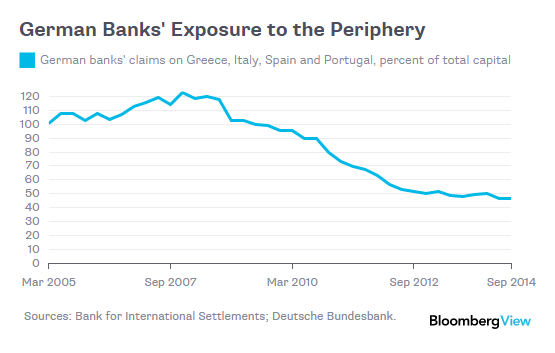
Harris&Ewing Red Cross Motor Corps, Washington, DC 1917
Just another normal morning at the Automatic Earth. Shaking off the local drink – when in Rome.. – and perusing a thousand views and pieces, many on the inevitable topic of ‘Da Referendum’. And I got to say, I can’t even tell whether it’s just me, but there is this huge divide between what a simple vote can and should be, and how it is perceived and presented.
And no, it’s not my ouzo-riddled stupor, it’s what common sense I have left that has me wondering what causes the divide. Case in point, Bloomberg has a piece called “Tsipras Asking Grandma to Figure Out If Greek Debt Deal Is Fair”. The implied connotation being that asking grandma about anything other than knitting patterns and souvlaki recipes is asking for trouble. What does she know? Politics should be decided by politicians. Well, and bankers of course. And Bloomberg editors. Did I mention economists?
Tsipras Asking Grandma to Figure Out If Greek Debt Deal Is Fair
Economists with PhDs and hedge-fund traders can barely stay on top of the vagaries of Greece’s spiraling debt crisis. Now, try getting grandma to vote on it. That’s what Prime Minister Alexis Tsipras is doing by calling a snap referendum for July 5 on the latest bailout package from creditors.
The 68-word ballot question namechecks four international institutions and asks voters for their opinion on two highly technical documents that weren’t made public before the referendum call and were only translated into Greek on Saturday. Worse, they may no longer be on the table. IMF chief Christine Lagarde told the BBC late on Saturday that “legally speaking, the referendum will relate to proposals and arrangements which are no longer valid.”
Tsipras’s decision means everyone from fishermen to taxi-drivers and factory workers will have to form an opinion on the package, with their country’s economic future hanging in the balance. A rejection of the bailout terms could lead to an exit from the euro area and economic calamity; accepting them would probably keep Greece in the euro, but with more austerity.
“Usually in democracies, it’s the technocrats and the politicians who take care of the details, while voters are asked about broader issues and principles,” said Philip Shaw, the chief economist in London at asset manager Investec. “This is a transfer of responsibility from parliament to the voters.”
Now, we all know that when and where democracy was born, and I’m quite literally at a stone’s throw from the very spot it was, as I write this, grandma had precious little say. But grandpa did, and repeatedly, the idea was that people would vote on all big decisions to be made, instead of having them decided by some power-happy individual.
We all, or most of us, think to this day that that was a good, and indeed world-changing, initiative. We talk about democracy all the time like it’s a good thing. So where does Bloomberg come from belittling the concept to the point where they put the word ‘Grandma’ in their headline, in an obvious attempt at making the entire thing look ridiculous?
They could instead have said ‘grandpa’ (big difference already) or ‘cab driver’ or ‘unemployed person’ or, get ready for this, ‘the people’. “Tsipras Asking The People to Figure Out If Greek Debt Deal Is Fair”. Sounds completely different, doesn’t it? Really, we cannot talk about democracy anymore without trying to ridicule it, Bloomberg?
Greece’s own Mr Piggy, Evangelos Venizelos, who bears a lot of blame for what Greece goes through today from his stint as finance minister, and is still PASOK’s go-to guy, though they were almost voted out of existence in January, tried a nice take. He claimed that the referendum was unconstitutional, something to do with fiscal matters not being allowed to be out before the people.
As if Syriza were too stupid to have read the law before letting Tsipras call the July 5 vote.
I’m thinking there’s not a shade of doubt that we will see the craziest claims and reports and theories. From Greek opposition parties, from ‘respectable media’, from US and European spin doctors offering ‘help’ to the likes of Venizelos and Samaras et al.
But that Bloomberg thing sure sets the tone. We have lost even the most basic principle and notion of what democracy means: a vote by the people on matters that concern the people. As Yanis Varoufakis tweeted yesterday:
Democracy deserved a boost in euro-related matters. We just delivered it. Let the people decide. (Funny how radical this concept sounds!)
What else can we say? Let’s keep it at this: we’ve come a long way. We can’t even talk about democracy anymore without ridiculing it.
Oh, and the title of this piece? Blame Virgil, Roman poet, well over 2000 years ago.









